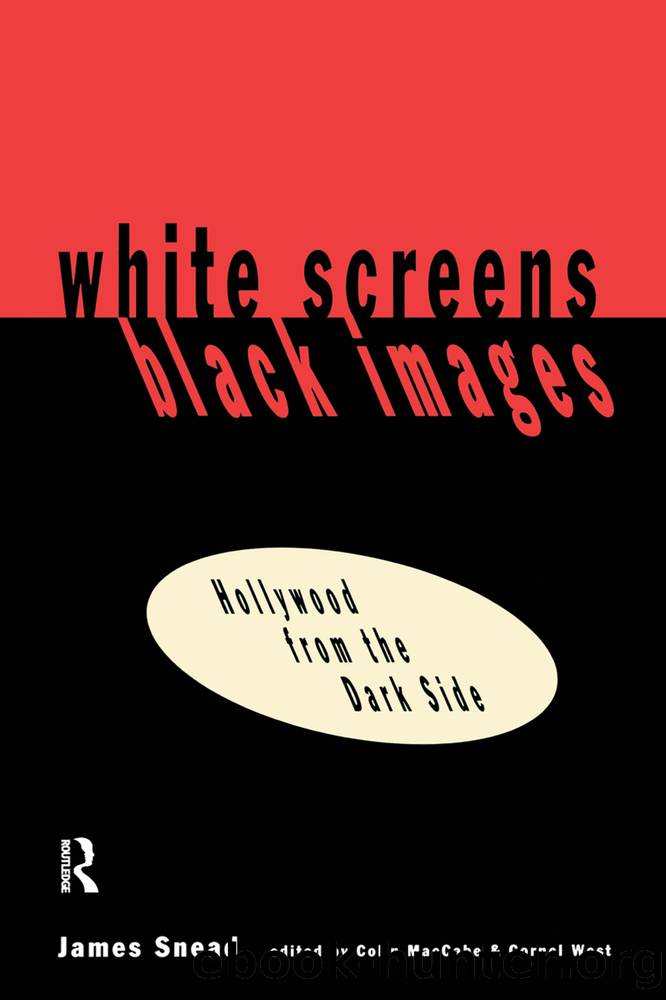White ScreensBlack Images by James Snead

Author:James Snead [Snead, James]
Language: eng
Format: epub
ISBN: 9781135199586
Publisher: Taylor and Francis
Published: 2022-06-15T00:00:00+00:00
Bette Davis: Jezebel
As we have already seen, the child-like female Hollywood star of the thirtiesâwhether child or adultâseems to be prized in society, and crucial to many film plots. Therefore, it should come as no surprise when, in the film Jezebel (1938), Bette Davis (Julie) angrily asks Henry Fonda (as Preston Dillard, her fiancé) why he treats her like a child. He responds: âBecause you act like oneâa spoiled one â¦â Julie answers: âYou used to say you liked me like that once: you never wanted me to change ⦠remember?â
This strange interchange highlights the quandary of such an ideal, which wants from the idealized white woman an adult ability to preserve and obey social norms, on the one hand, and a childlike capacity for periodically ignoring or breaking those constraints on the other. In effect, Preston is criticizing Julie here for obeying his orders, precisely when such orders call for the disobedience of other ordersâfor acting like a âspoiledâ child. Whereas the film Jezebel generally blames Julie for her own behavior and its results, her exchange with Preston points out precisely the double-bind which is certainly the more pertinent source of the filmâs tragic ending.
Since much of the plot of the film hinges on the question of command and obedience, it is perhaps no surprise that the âchildlikeâ blacks play a prominent role throughout the film, conveying, among other things, an early sense of institutional servility in the culture of âNew Orleans 1852.â The âplot of obedienceâ literally enwraps the filmâs narrative, right up to the ending, when Julie virtually commands Amy, Prestonâs Northern wife (Margaret Lindsay), to stay behind while she accompanies Preston to the dreaded âLazarette Island,â the place for the hopeless âyellow jackâ victims. If Miss Julie represents âchildish disobedienceâ (punishment is threatened, but never executed by white males), then the blacks that surround her represent âchildish obedienceâ (punishment threatened and executed), repeating the interracial dynamics of the Shirley Temple movies, but with more dire results.
The first words of the film are: âBoy: stop here â¦,â yelled by Buck Cantrell (Prestonâs rival for Julieâs attention) to a black carriage-driver. Minutes later, another carriage-driver, pulling guests up to where Julie lives with her mother, doffs his hat, repeating âyowsmâ (âyes, maâamâ) to his passengerâs orders, which are so frequent that he continues saying âyowsmâ mechanically even after the guests have already gone inside. Although this initial servility seems merely a cause for laughter, it actually strikes the dominant thematic chord of obedience for the entire movie.
Later (still within the first five minutes of the film), Julie arrives in her riding garb, and is literally surrounded by black servants. Three of them take care of her horse, others rush in front of her to smooth the way. She arrives at her own party scandalously late, and without changing her clothes, but is still fussed overâwhile walking!âby at least a half dozen servants. The abundance of blacks here certainly exaggerates Julieâs social distance from them, but also in some ways illustrates her absolute dependence upon them.
Download
This site does not store any files on its server. We only index and link to content provided by other sites. Please contact the content providers to delete copyright contents if any and email us, we'll remove relevant links or contents immediately.
Phoenicians among Others: Why Migrants Mattered in the Ancient Mediterranean by Denise Demetriou(600)
american english file 1 student book 3rd edition by Unknown(598)
Verus Israel: Study of the Relations Between Christians and Jews in the Roman Empire, AD 135-425 by Marcel Simon(589)
Caesar Rules: The Emperor in the Changing Roman World (c. 50 BC â AD 565) by Olivier Hekster(569)
Basic japanese A grammar and workbook by Unknown(564)
Europe, Strategy and Armed Forces by Sven Biscop Jo Coelmont(513)
Give Me Liberty, Seventh Edition by Foner Eric & DuVal Kathleen & McGirr Lisa(491)
Banned in the U.S.A. : A Reference Guide to Book Censorship in Schools and Public Libraries by Herbert N. Foerstel(483)
The Roman World 44 BC-AD 180 by Martin Goodman(472)
Reading Colonial Japan by Mason Michele;Lee Helen;(466)
DS001-THE MAN OF BRONZE by J.R.A(458)
Imperial Rome AD 193 - 284 by Ando Clifford(451)
The Dangerous Life and Ideas of Diogenes the Cynic by Jean-Manuel Roubineau(451)
Introducing Christian Ethics by Samuel Wells and Ben Quash with Rebekah Eklund(448)
The Oxford History of World War II by Richard Overy(444)
Catiline by Henrik Ibsen--Delphi Classics (Illustrated) by Henrik Ibsen(422)
Literary Mathematics by Michael Gavin;(407)
Language Hacking Mandarin by Benny Lewis & Dr. Licheng Gu(403)
Brand by Henrik Ibsen--Delphi Classics (Illustrated) by Henrik Ibsen(382)
